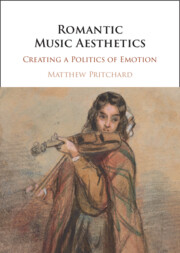Book contents
- Romantic Music Aesthetics
- Romantic Music Aesthetics
- Copyright page
- Contents
- Figures
- Music Examples
- Acknowledgements
- Note on Translation
- Introduction
- 1 Staging Sentimentality
- 2 The Legacy of Rousseau
- 3 The Composer as Genius
- 4 Idealist Aesthetics and the Music Critic
- 5 Picturing the Musical Absolute
- 6 Between Idealism and Realism I: The French Socialists
- 7 Between Idealism and Realism II: After Hegel
- 8 From Hanslick to the Twentieth Century
- Conclusion: The Fate of Feeling
- Bibliography
- Index
Introduction
Published online by Cambridge University Press: 22 November 2024
- Romantic Music Aesthetics
- Romantic Music Aesthetics
- Copyright page
- Contents
- Figures
- Music Examples
- Acknowledgements
- Note on Translation
- Introduction
- 1 Staging Sentimentality
- 2 The Legacy of Rousseau
- 3 The Composer as Genius
- 4 Idealist Aesthetics and the Music Critic
- 5 Picturing the Musical Absolute
- 6 Between Idealism and Realism I: The French Socialists
- 7 Between Idealism and Realism II: After Hegel
- 8 From Hanslick to the Twentieth Century
- Conclusion: The Fate of Feeling
- Bibliography
- Index
Summary
The Introduction critiques the dominant critical-musicological picture of Romanticism as a nineteenth-century aesthetic paradigm emphasizing artistic autonomy and escape from the social, and posits an alternative. Romantic ideas of sociality in art and music differed from modern materialist accounts in highlighting the mediatory role of emotion or feeling alongside further ‘ideal’ or imaginative factors in listeners’ experience. Such ideas converge with recent contributions in sociology, music studies, anthropology and philosophy which frame affect in social, holistic terms as atmosphere, Stimmung (mood or “attunement”) and correspondence. These are summarized in the term ‘affective relationality’. In both musicology after Carl Dahlhaus and the recent history of emotions, a watershed c.1800 has separated the Romantic paradigm from its eighteenth-century predecessors, instead of paying attention to the continuity between eighteenth-century sentimentality and Romanticism. This ‘sentimental-Romantic’ continuum is exemplified by Mme de Staël, whose writings’ resonances with the book’s chapters are explored.
Keywords
- Type
- Chapter
- Information
- Romantic Music AestheticsCreating a Politics of Emotion, pp. 1 - 25Publisher: Cambridge University PressPrint publication year: 2024

